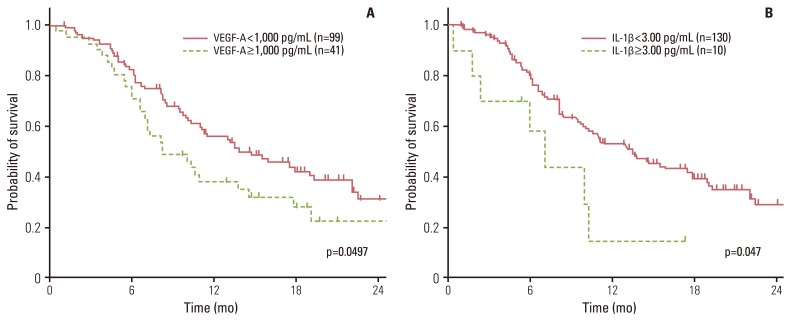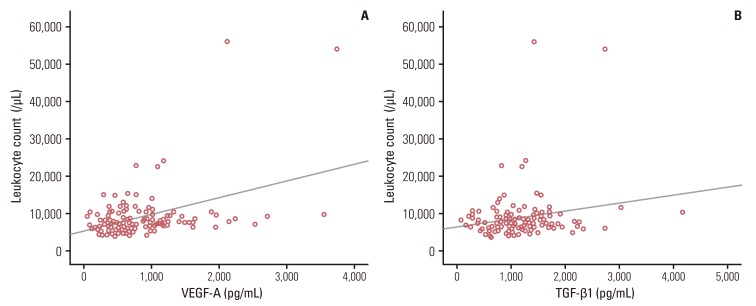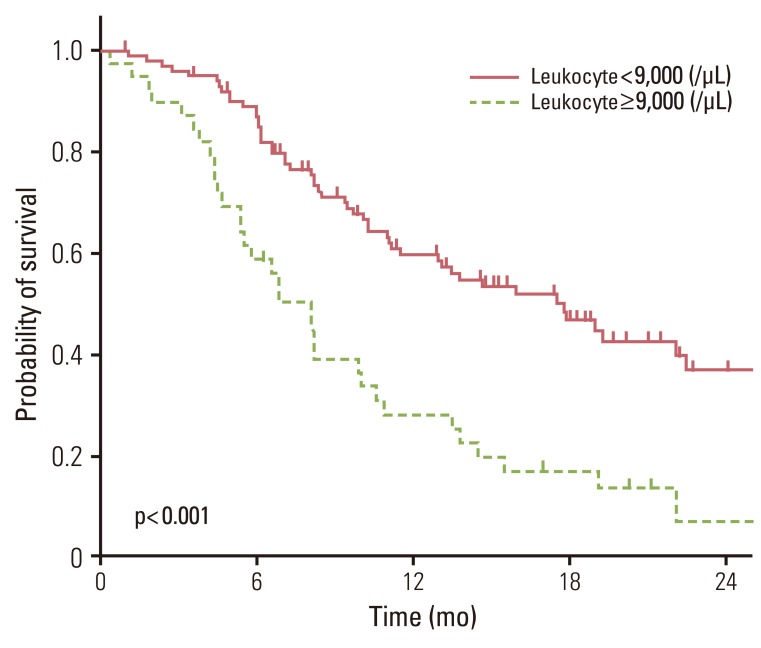Cancer Res Treat.
2013 Dec;45(4):325-333.
Clinical Implications of VEGF, TGF-beta1, and IL-1beta in Patients with Advanced Non-small Cell Lung Cancer
- Affiliations
-
- 1Department of Internal Medicine, Seoul National University College of Medicine, Seoul, Korea. kimdw@snu.ac.kr
- 2Cancer Research Institute, Seoul National University College of Medicine, Seoul, Korea.
Abstract
- PURPOSE
Vascular endothelial growth factor (VEGF)-A, VEGF165b, interleukin (IL)-1beta, and transforming growth factor (TGF)-beta1 are known to influence tumor angiogenesis. Clinical implications of these cytokines need to be elucidated.
MATERIALS AND METHODS
Using clinical data and baseline serum samples of 140 consecutive patients with advanced non-small cell lung cancer who received platinum-based combination chemotherapy, we investigated the association among serum cytokine levels, treatment outcomes, as well as leukocyte and platelet counts.
RESULTS
The median age of patients was 64 years (range, 26 to 86 years). The male to female ratio was 104:36. High TGF-beta1 and IL-1beta levels were associated with shorter progression-free survival, and high VEGF-A and IL-1beta levels were associated with shorter overall survival in the univariate analysis. VEGF165b was not related to the treatment outcomes. Leukocytosis and thrombocytosis were associated with shorter overall survival. The multivariate analysis demonstrated that VEGF-A, IL-1beta, and leukocytosis were significant prognostic factors (p=0.0497, p=0.047, and p<0.001, respectively). Leukocytosis was not associated with recent pneumonia (p=0.937) and correlated with VEGF-A (p<0.001) and TGF-beta1 (p=0.020) levels.
CONCLUSION
Serum VEGF-A, TGF-1beta, and IL-1beta levels, in addition to leukocyte and platelet counts, are shown to be associated with clinical outcomes. Leukocyte and platelet counts are correlated with serum VEGF-A and TGF-beta1 levels.
Keyword
MeSH Terms
-
Blood Platelets
Carcinoma, Non-Small-Cell Lung*
Cytokines
Disease-Free Survival
Drug Therapy, Combination
Female
Humans
Interleukin-1beta
Interleukins
Leukocytes
Leukocytosis
Male
Multivariate Analysis
Platelet Count
Pneumonia
Thrombocytosis
Transforming Growth Factor beta1*
Transforming Growth Factors
Vascular Endothelial Growth Factor A*
Cytokines
Interleukin-1beta
Interleukins
Transforming Growth Factor beta1
Transforming Growth Factors
Vascular Endothelial Growth Factor A
Figure
Reference
-
1. Poon RT, Fan ST, Wong J. Clinical implications of circulating angiogenic factors in cancer patients. J Clin Oncol. 2001; 19:1207–1225. PMID: 11181687.
Article2. Shchors K, Evan G. Tumor angiogenesis: cause or consequence of cancer? Cancer Res. 2007; 67:7059–7061. PMID: 17671171.3. Bremnes RM, Camps C, Sirera R. Angiogenesis in non-small cell lung cancer: the prognostic impact of neoangiogenesis and the cytokines VEGF and bFGF in tumours and blood. Lung Cancer. 2006; 51:143–158. PMID: 16360975.
Article4. Woolard J, Wang WY, Bevan HS, Qiu Y, Morbidelli L, Pritchard-Jones RO, et al. VEGF165b, an inhibitory vascular endothelial growth factor splice variant: mechanism of action, in vivo effect on angiogenesis and endogenous protein expression. Cancer Res. 2004; 64:7822–7835. PMID: 15520188.5. Pepper MS. Transforming growth factor-beta: vasculogenesis, angiogenesis, and vessel wall integrity. Cytokine Growth Factor Rev. 1997; 8:21–43. PMID: 9174661.
Article6. Pertovaara L, Kaipainen A, Mustonen T, Orpana A, Ferrara N, Saksela O, et al. Vascular endothelial growth factor is induced in response to transforming growth factor-beta in fibroblastic and epithelial cells. J Biol Chem. 1994; 269:6271–6274. PMID: 8119973.
Article7. Hasegawa Y, Takanashi S, Kanehira Y, Tsushima T, Imai T, Okumura K. Transforming growth factor-beta1 level correlates with angiogenesis, tumor progression, and prognosis in patients with nonsmall cell lung carcinoma. Cancer. 2001; 91:964–971. PMID: 11251948.8. Raynal S, Nocentini S, Croisy A, Lawrence DA, Jullien P. Transforming growth factor-beta1 enhances the lethal effects of DNA-damaging agents in a human lung-cancer cell line. Int J Cancer. 1997; 72:356–361. PMID: 9219846.9. Chod J, Zavadova E, Halaska MJ, Strnad P, Fucikova T, Rob L. Preoperative transforming growth factor-beta 1 (TGF-beta 1) plasma levels in operable breast cancer patients. Eur J Gynaecol Oncol. 2008; 29:613–616. PMID: 19115689.10. Shariat SF, Kattan MW, Traxel E, Andrews B, Zhu K, Wheeler TM, et al. Association of pre- and postoperative plasma levels of transforming growth factor beta(1) and interleukin 6 and its soluble receptor with prostate cancer progression. Clin Cancer Res. 2004; 10:1992–1999. PMID: 15041717.11. Ivanovic V, Todorovic-Rakovic N, Demajo M, Neskovic-Konstantinovic Z, Subota V, Ivanisevic-Milovanovic O, et al. Elevated plasma levels of transforming growth factor-beta 1 (TGF-beta 1) in patients with advanced breast cancer: association with disease progression. Eur J Cancer. 2003; 39:454–461. PMID: 12751375.12. Zeisler H, Tempfer C, Joura EA, Sliutz G, Koelbl H, Wagner O, et al. Serum interleukin 1 in ovarian cancer patients. Eur J Cancer. 1998; 34:931–933. PMID: 9797710.13. Salven P, Orpana A, Joensuu H. Leukocytes and platelets of patients with cancer contain high levels of vascular endothelial growth factor. Clin Cancer Res. 1999; 5:487–491. PMID: 10100697.14. Assoian RK, Komoriya A, Meyers CA, Miller DM, Sporn MB. Transforming growth factor-beta in human platelets. Identification of a major storage site, purification, and characterization. J Biol Chem. 1983; 258:7155–7160. PMID: 6602130.
Article15. Letterio JJ, Roberts AB. Regulation of immune responses by TGF-beta. Annu Rev Immunol. 1998; 16:137–161. PMID: 9597127.16. Dinarello CA. The interleukin-1 family: 10 years of discovery. FASEB J. 1994; 8:1314–1325. PMID: 8001745.17. Choi JH, Kim HC, Lim HY, Nam DK, Kim HS, Yi JW, et al. Vascular endothelial growth factor in the serum of patients with non-small cell lung cancer: correlation with platelet and leukocyte counts. Lung Cancer. 2001; 33:171–179. PMID: 11551412.
Article18. Brattstrom D, Bergqvist M, Hesselius P, Larsson A, Lamberg K, Wernlund J, et al. Elevated preoperative serum levels of angiogenic cytokines correlate to larger primary tumours and poorer survival in non-small cell lung cancer patients. Lung Cancer. 2002; 37:57–63. PMID: 12057868.
Article19. Beasley MB, Brambilla E, Travis WD. The 2004 World Health Organization classification of lung tumors. Semin Roentgenol. 2005; 40:90–97. PMID: 15898407.
Article20. Therasse P, Arbuck SG, Eisenhauer EA, Wanders J, Kaplan RS, Rubinstein L, et al. New guidelines to evaluate the response to treatment in solid tumors. European Organization for Research and Treatment of Cancer, National Cancer Institute of the United States, National Cancer Institute of Canada. J Natl Cancer Inst. 2000; 92:205–216. PMID: 10655437.21. Foekens JA, Peters HA, Grebenchtchikov N, Look MP, Meijer-van Gelder ME, Geurts-Moespot A, et al. High tumor levels of vascular endothelial growth factor predict poor response to systemic therapy in advanced breast cancer. Cancer Res. 2001; 61:5407–5414. PMID: 11454684.22. Ladomery MR, Harper SJ, Bates DO. Alternative splicing in angiogenesis: the vascular endothelial growth factor paradigm. Cancer Lett. 2007; 249:133–142. PMID: 17027147.
Article23. Mohle R, Green D, Moore MA, Nachman RL, Rafii S. Constitutive production and thrombin-induced release of vascular endothelial growth factor by human megakaryocytes and platelets. Proc Natl Acad Sci U S A. 1997; 94:663–668. PMID: 9012841.
Article
- Full Text Links
- Actions
-
Cited
- CITED
-
- Close
- Share
- Similar articles
-
- Transforming Growth Factor-beta1(TGF-beta1) Synthesis of Human Peritoneal Mesothelial Cell
- Determination of Interleukin-1beta and Transforming Growth Factor-beta1 Levels in Early Human Embryo Coculture-Conditioned Media
- Effect of Transforming Growth Factor-beta1 (TGF-beta1) on the Expression of Vascular cell Adhesion Molecule-1 (VCAM-1) in Cultured Human Peritoneal Mesothelial Cells (HPMCs)
- Expression of Cytokines in Radiation Injured Brain at Acute Phase
- The Expression of TGF-beta1 and TGF-beta Receptor I in Human Lung Cancer




